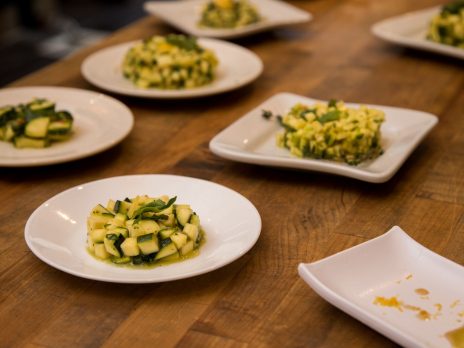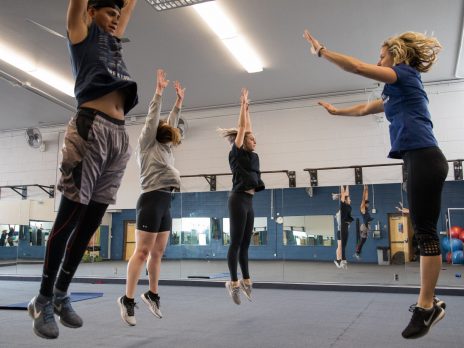Did you know that we spend an average of 2 hours and 22 minutes daily on social media? Yikes!
We all love to spend time browsing through memes and dog videos…and then there are all the nutrition and fitness tips. Sigh.
Some Instagrammers are great (like our very own UCAN page on Instagram), and others, well not-so-much. Many accounts you follow may be feeding you false information and a whole lot of false hope as well.
 False Information
False Information
It’s easy to come across posts promoting diet culture, weight loss, and misinformed fitness tips. If you look up something like “#keto” on Instagram, you could probably find a million different posts.
According to research, these fad diets
- are not sustainable
- negatively effect body image while promoting weight loss (that research says is almost ALWAYS followed by weight regain)
- may have adverse health effects (nutrient deficiencies, raised blood pressure, high cholesterol levels, etc.) even if weight loss is achieved
A lot of the time these pages will also use social media as a platform to promote and sell different powders, pills, and potions that have positive health claims but are NOT approved by any organization such as the FDA, and NOT backed by research. (If you do come across a study “proving” its effectiveness, read the fine print, because it was probably funded by the company itself…so, yep, it’s biased!)
Social Media and Body Image
Body image already has been shown to be negatively influenced by social media. Makes sense with all the exposure to thin celebrities and models. And then there are the apps like Facetune that help edit *some of these models’ bodies to look very different than they are.
We are literally stuffing our faces with images of what the “ideal” person should look like and, of course, we want to be like them.
More often than not, these same pages will showcase skinny, fit, and muscular individuals. We’re bombarded by a marketing ploy that sends the message to users that “if you do what I say you’ll look just like me!”. Rather than promoting health-supporting self-care habits and realistic exercise routines, these pages will hurt self-efficacy with their expectations of what the “perfect” human should look like.
How do I know which pages to trust?
Here are a few questions to ask yourself when trying to find some tips on social media about living a healthy lifestyle:
- Does the Instagrammer have the necessary training and credentials to be providing that advice? Are they a doctor, educator, personal trainer? Or are they an “entrepreneur” or “influencer”? (Note: Just having credentials does not ALWAYS mean they are providing evidence-based advice, but at least they are more likely to.)
- Does the advice on the page use realistic words or extreme words? For example, “here are ways to add more veggies at dinner time” is worth clicking on. We could all use some useful tips like that. Whereas, “how to eliminate carbs from your diet” is just ridiculous and not sustainable.
 Does the page promote body kindness in any way? Do they talk about loving yourself or changing yourself? Stick to Instagrammers that promote loving yourself and body positive messages and unfollow folks who make you feel inadequate or promote the concept that self-love can only come after you change your body.
Does the page promote body kindness in any way? Do they talk about loving yourself or changing yourself? Stick to Instagrammers that promote loving yourself and body positive messages and unfollow folks who make you feel inadequate or promote the concept that self-love can only come after you change your body. - Do they talk about having fun with and enjoying exercise, or exercising to lose weight quick? Choose the Instagrammers who provide tips on making physical activity more fun or finding things you love.
- Are there tips about having a healthy relationship with food, or tips on how to cut calories? Restriction always backfires. Follow Instagrammers who promote eating a variety, eating mindfully and listening to hunger and fullness cues to guide your plate. Ditch the counting calories, macros or points folks. Those practices often make people obsess and can easily lead you down a path of disordered eating and body hatred.
And let’s end with a shameless plug. Probably the most important tip would be to follow UCAN on Instagram @nauhealthcoach for more ideas on how to build healthy habits! We write blogs and post tips that are reviewed by a dietitian, who is also a nutrition professor and researcher. You can trust us!
Here are a few other “safe” Instagrammers to follow:
@evolveflg (Flagstaff Instagrammer)
@megan.meyer.rd (Flagstaff Instagrammer)
@aaronfloresrdn
@budgetbytes
@rebeccascritchfield
@hgoodrichrd
@chr1styharrison
@thebodylovesociety
@encouragingdietitian
@ericaleonnutrition
@foodandfearless
@DietitianAnna
@beauty_redefined
@alissarumseyrd
@lizbrinkman_rd (from Phoenix)
@mindfulrd
@summerinnanen
@foodpeacedietitian
@donuteatingdietitian
@theantidietplan
@marcird
@antidiet_dietitian
@realtalkrd
@benourishedpdx
@evelyntribole
 Tommy Houston, Health Coach
Tommy Houston, Health Coach